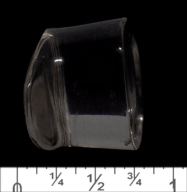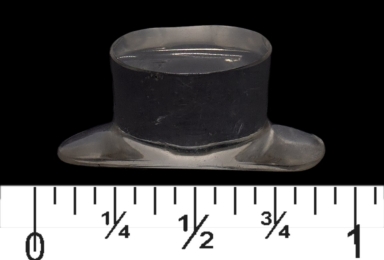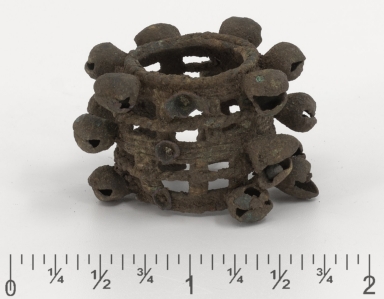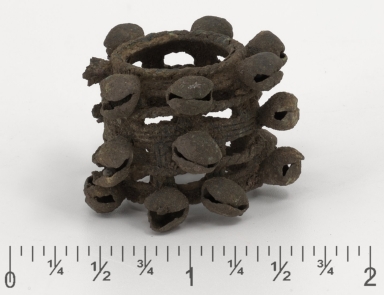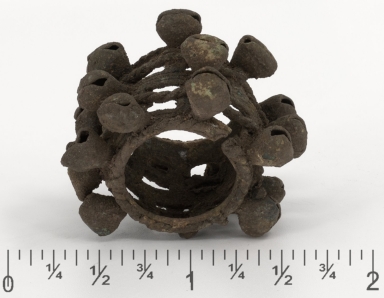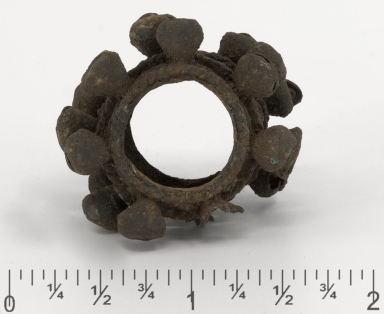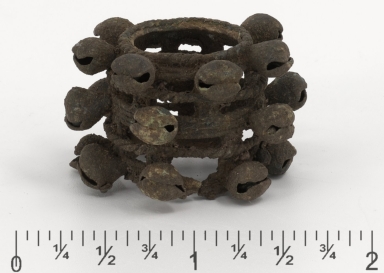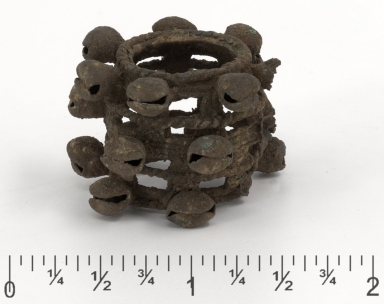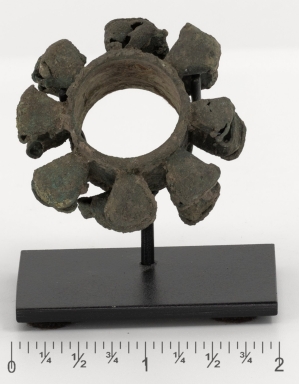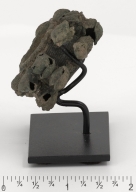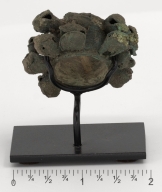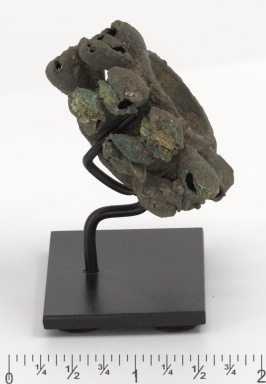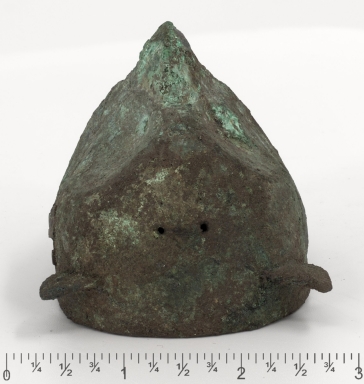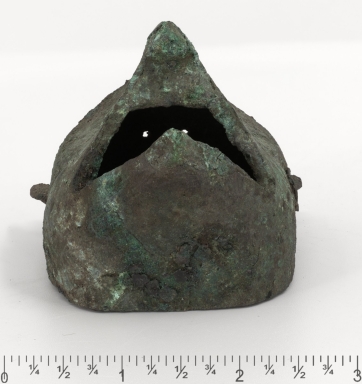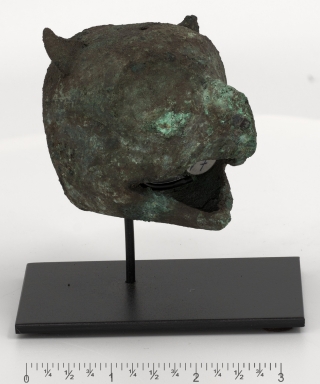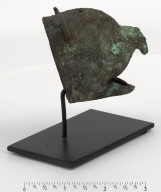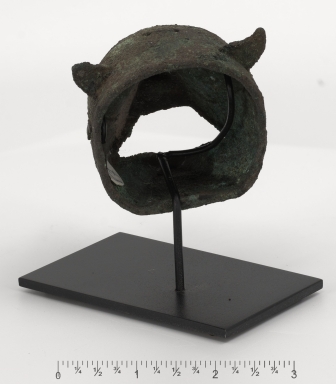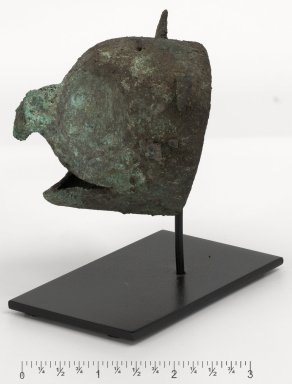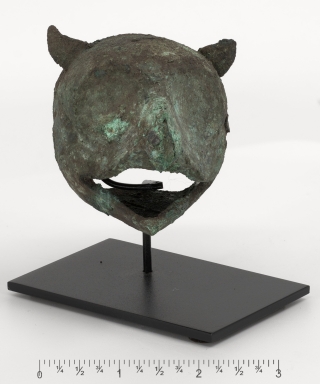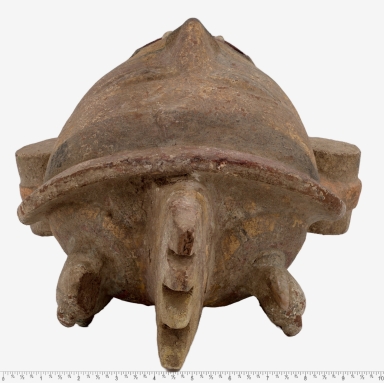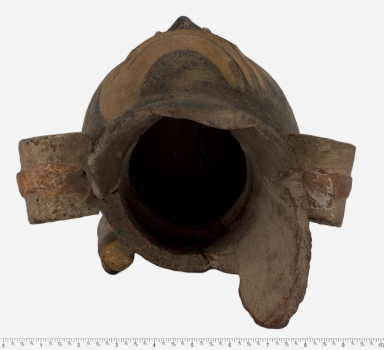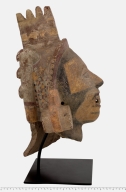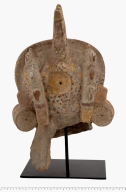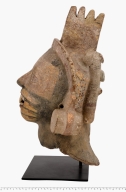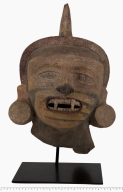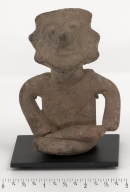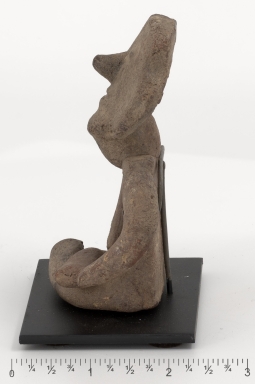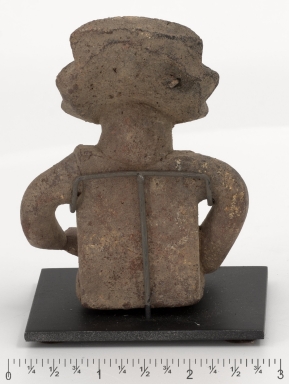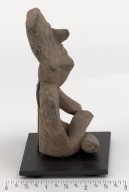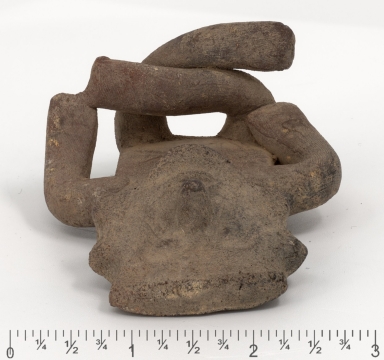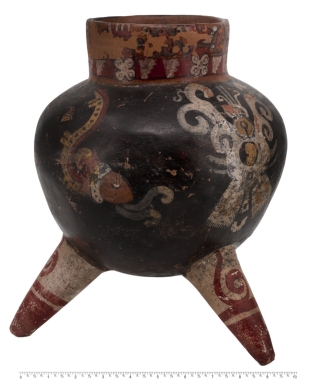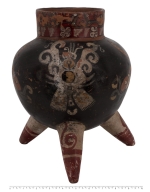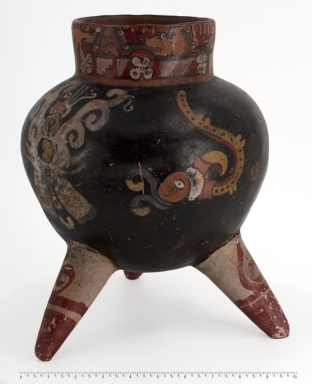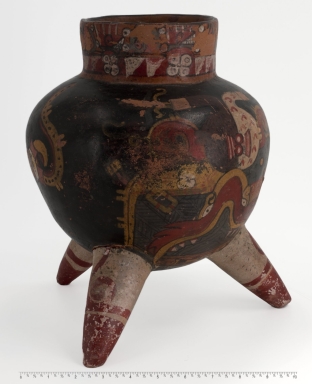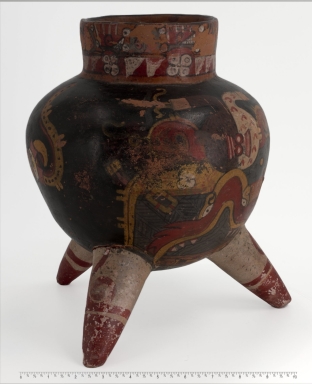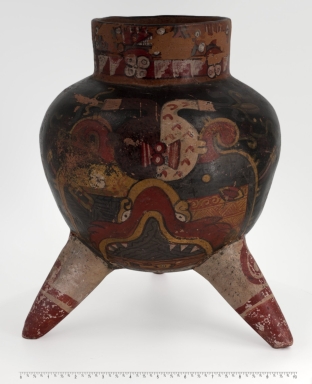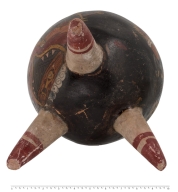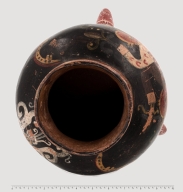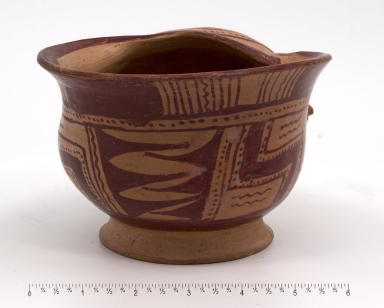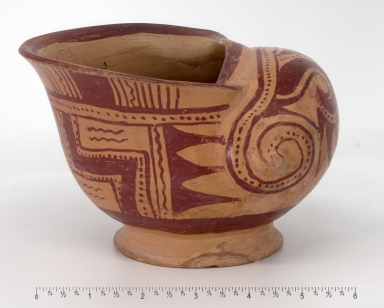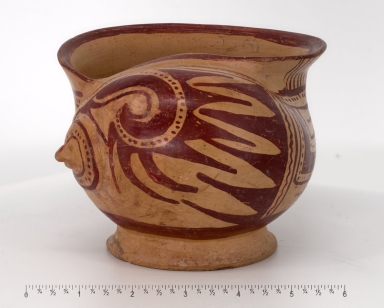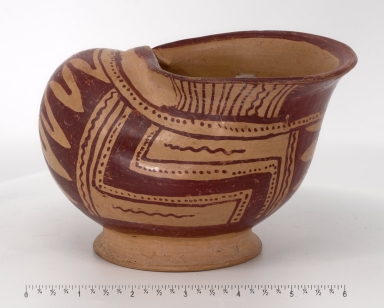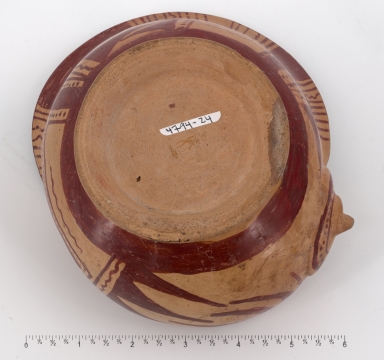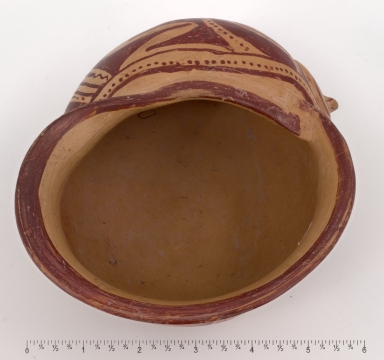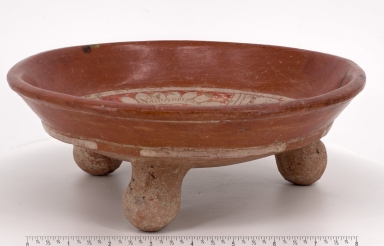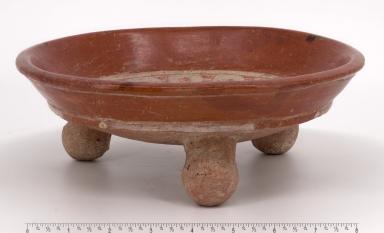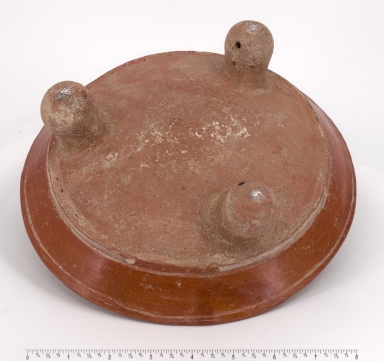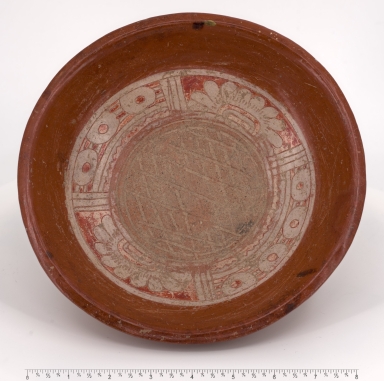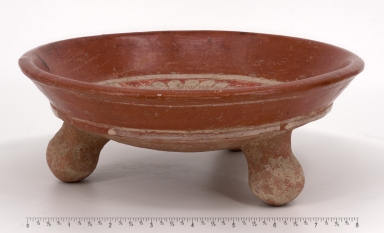Who What Where WhenWHERE
|
Title
Rock Crystal Labret
Description
Mixtec artisans were known to be exceptional craftsmen. This fact is reflected in this quartz labret. The stone had to be core flaked, pressure flaked, and abraded. All of these procedures require great skill, patience, care, and unbelievable amount of time.
Subject
[Labrets, Jewelry--Mexico--Oaxaca (State), Stone carving--Mexico--Oaxaca (State), Mixtec art--Mexico--Oaxaca (State), Indigenous peoples--Antiquities]
Date
between 800 and 1532
Title
Rock Crystal Labret
Description
Mixtec artisans were known to be exceptional craftsmen. This fact is reflected in this quartz labret. The stone had to be core flaked, pressure flaked, and abraded. All of these procedures require great skill, patience, care, and unbelievable amount of time.
Subject
[Labrets, Jewelry--Mexico--Oaxaca (State), Stone carving--Mexico--Oaxaca (State), Mixtec art--Mexico--Oaxaca (State), Indigenous peoples--Antiquities]
Date
between 800 and 1532
Title
Copper shaft maces : 1.
Description
The Mixtec and the Aztec excelled in metalwork. Archaeologists believe metalsmithing moved from South America to Central America and into West Mexico. The Mixtec and the Tarascan favored copper, while the Aztec went for the gold. Needless to say, the conquistadores love gold and that is why there are few examples of this extrordinary craftsmanship.
Subject
[Copper jewelry--Mexico, Jewelry--Mexico, Mixtec art--Mexico, Indigenous peoples--Antiquities]
Date
between 900 and 1200
Title
Copper shaft maces : 1.
Description
The Mixtec and the Aztec excelled in metalwork. Archaeologists believe metalsmithing moved from South America to Central America and into West Mexico. The Mixtec and the Tarascan favored copper, while the Aztec went for the gold. Needless to say, the conquistadores love gold and that is why there are few examples of this extrordinary craftsmanship.
Subject
[Copper jewelry--Mexico, Jewelry--Mexico, Mixtec art--Mexico, Indigenous peoples--Antiquities]
Date
between 900 and 1200
Title
Copper shaft maces : 1.
Description
The Mixtec and the Aztec excelled in metalwork. Archaeologists believe metalsmithing moved from South America to Central America and into West Mexico. The Mixtec and the Tarascan favored copper, while the Aztec went for the gold. Needless to say, the conquistadores love gold and that is why there are few examples of this extrordinary craftsmanship.
Subject
[Copper jewelry--Mexico, Jewelry--Mexico, Mixtec art--Mexico, Indigenous peoples--Antiquities]
Date
between 900 and 1200
Title
Copper shaft maces : 1.
Description
The Mixtec and the Aztec excelled in metalwork. Archaeologists believe metalsmithing moved from South America to Central America and into West Mexico. The Mixtec and the Tarascan favored copper, while the Aztec went for the gold. Needless to say, the conquistadores love gold and that is why there are few examples of this extrordinary craftsmanship.
Subject
[Copper jewelry--Mexico, Jewelry--Mexico, Mixtec art--Mexico, Indigenous peoples--Antiquities]
Date
between 900 and 1200
Title
Copper shaft maces : 1.
Description
The Mixtec and the Aztec excelled in metalwork. Archaeologists believe metalsmithing moved from South America to Central America and into West Mexico. The Mixtec and the Tarascan favored copper, while the Aztec went for the gold. Needless to say, the conquistadores love gold and that is why there are few examples of this extrordinary craftsmanship.
Subject
[Copper jewelry--Mexico, Jewelry--Mexico, Mixtec art--Mexico, Indigenous peoples--Antiquities]
Date
between 900 and 1200
Title
Copper shaft maces : 1.
Description
The Mixtec and the Aztec excelled in metalwork. Archaeologists believe metalsmithing moved from South America to Central America and into West Mexico. The Mixtec and the Tarascan favored copper, while the Aztec went for the gold. Needless to say, the conquistadores love gold and that is why there are few examples of this extrordinary craftsmanship.
Subject
[Copper jewelry--Mexico, Jewelry--Mexico, Mixtec art--Mexico, Indigenous peoples--Antiquities]
Date
between 900 and 1200
Title
Copper shaft maces : 2.
Description
The Mixtec and the Aztec excelled in metalwork. Archaeologists believe metalsmithing moved from South America to Central America and into West Mexico. The Mixtec and the Tarascan favored copper, while the Aztec went for the gold. Needless to say, the conquistadores love gold and that is why there are few examples of this extraordinary craftsmanship.
Subject
[Copper jewelry--Mexico, Jewelry--Mexico, Mixtec art--Mexico, Indigenous peoples--Antiquities]
Date
between 900 and 1200
Title
Copper shaft maces : 2.
Description
The Mixtec and the Aztec excelled in metalwork. Archaeologists believe metalsmithing moved from South America to Central America and into West Mexico. The Mixtec and the Tarascan favored copper, while the Aztec went for the gold. Needless to say, the conquistadores love gold and that is why there are few examples of this extraordinary craftsmanship.
Subject
[Copper jewelry--Mexico, Jewelry--Mexico, Mixtec art--Mexico, Indigenous peoples--Antiquities]
Date
between 900 and 1200
Title
Copper shaft maces : 2.
Description
The Mixtec and the Aztec excelled in metalwork. Archaeologists believe metalsmithing moved from South America to Central America and into West Mexico. The Mixtec and the Tarascan favored copper, while the Aztec went for the gold. Needless to say, the conquistadores love gold and that is why there are few examples of this extraordinary craftsmanship.
Subject
[Copper jewelry--Mexico, Jewelry--Mexico, Mixtec art--Mexico, Indigenous peoples--Antiquities]
Date
between 900 and 1200
Title
Copper shaft maces : 2.
Description
The Mixtec and the Aztec excelled in metalwork. Archaeologists believe metalsmithing moved from South America to Central America and into West Mexico. The Mixtec and the Tarascan favored copper, while the Aztec went for the gold. Needless to say, the conquistadores love gold and that is why there are few examples of this extraordinary craftsmanship.
Subject
[Copper jewelry--Mexico, Jewelry--Mexico, Mixtec art--Mexico, Indigenous peoples--Antiquities]
Date
between 900 and 1200
Title
Owl Maskette
Description
This hollow, open-back copper maskette was cast using the lost-wax technique. The owl maskette was formed first in bees wax. The bees wax maskette was embedded in a super fine material such as clay. The clay and beeswax maskette was slowly heated melting out the bees wax and hardening the clay matrix. Molten metal was poured into the empty maskette are and cooled.
Subject
[Masks--Mexico, Aztec art--Mexico, Mixtec art--Antiquities, Purépecha art--Mexico, Indigenous peoples--Antiquities]
Date
between 900 and 1200
Title
Owl Maskette
Description
This hollow, open-back copper maskette was cast using the lost-wax technique. The owl maskette was formed first in bees wax. The bees wax maskette was embedded in a super fine material such as clay. The clay and beeswax maskette was slowly heated melting out the bees wax and hardening the clay matrix. Molten metal was poured into the empty maskette are and cooled.
Subject
[Masks--Mexico, Aztec art--Mexico, Mixtec art--Antiquities, Purépecha art--Mexico, Indigenous peoples--Antiquities]
Date
between 900 and 1200
Title
Owl Maskette
Description
This hollow, open-back copper maskette was cast using the lost-wax technique. The owl maskette was formed first in bees wax. The bees wax maskette was embedded in a super fine material such as clay. The clay and beeswax maskette was slowly heated melting out the bees wax and hardening the clay matrix. Molten metal was poured into the empty maskette are and cooled.
Subject
[Masks--Mexico, Aztec art--Mexico, Mixtec art--Antiquities, Purépecha art--Mexico, Indigenous peoples--Antiquities]
Date
between 900 and 1200
Title
Owl Maskette
Description
This hollow, open-back copper maskette was cast using the lost-wax technique. The owl maskette was formed first in bees wax. The bees wax maskette was embedded in a super fine material such as clay. The clay and beeswax maskette was slowly heated melting out the bees wax and hardening the clay matrix. Molten metal was poured into the empty maskette are and cooled.
Subject
[Masks--Mexico, Aztec art--Mexico, Mixtec art--Antiquities, Purépecha art--Mexico, Indigenous peoples--Antiquities]
Date
between 900 and 1200
Title
Owl Maskette
Description
This hollow, open-back copper maskette was cast using the lost-wax technique. The owl maskette was formed first in bees wax. The bees wax maskette was embedded in a super fine material such as clay. The clay and beeswax maskette was slowly heated melting out the bees wax and hardening the clay matrix. Molten metal was poured into the empty maskette are and cooled.
Subject
[Masks--Mexico, Aztec art--Mexico, Mixtec art--Antiquities, Purépecha art--Mexico, Indigenous peoples--Antiquities]
Date
between 900 and 1200
Title
Owl Maskette
Description
This hollow, open-back copper maskette was cast using the lost-wax technique. The owl maskette was formed first in bees wax. The bees wax maskette was embedded in a super fine material such as clay. The clay and beeswax maskette was slowly heated melting out the bees wax and hardening the clay matrix. Molten metal was poured into the empty maskette are and cooled.
Subject
[Masks--Mexico, Aztec art--Mexico, Mixtec art--Antiquities, Purépecha art--Mexico, Indigenous peoples--Antiquities]
Date
between 900 and 1200
Title
Owl Maskette
Description
This hollow, open-back copper maskette was cast using the lost-wax technique. The owl maskette was formed first in bees wax. The bees wax maskette was embedded in a super fine material such as clay. The clay and beeswax maskette was slowly heated melting out the bees wax and hardening the clay matrix. Molten metal was poured into the empty maskette are and cooled.
Subject
[Masks--Mexico, Aztec art--Mexico, Mixtec art--Antiquities, Purépecha art--Mexico, Indigenous peoples--Antiquities]
Date
between 900 and 1200
Title
Xantile head : maquiltonal : five flower.
Description
A Xantile is an incsense burner in the form of a seated anthropomorphic being. Burning incense placed inside the xantile emerges as smoke from the mouth, which represents and offering to the Maquiltonals.
Subject
[Ceramic sculpture--Mexico--Cholula (Hidalgo), Mixtec art--Mexico--Cholula (Hidalgo), Indigenous peoples--Antiquities]
Date
between 900 and 1250
Title
Xantile head : maquiltonal : five flower.
Description
A Xantile is an incsense burner in the form of a seated anthropomorphic being. Burning incense placed inside the xantile emerges as smoke from the mouth, which represents and offering to the Maquiltonals.
Subject
[Ceramic sculpture--Mexico--Cholula (Hidalgo), Mixtec art--Mexico--Cholula (Hidalgo), Indigenous peoples--Antiquities]
Date
between 900 and 1250
Title
Xantile head : maquiltonal : five flower.
Description
A Xantile is an incsense burner in the form of a seated anthropomorphic being. Burning incense placed inside the xantile emerges as smoke from the mouth, which represents and offering to the Maquiltonals.
Subject
[Ceramic sculpture--Mexico--Cholula (Hidalgo), Mixtec art--Mexico--Cholula (Hidalgo), Indigenous peoples--Antiquities]
Date
between 900 and 1250
Title
Xantile head : maquiltonal : five flower.
Description
A Xantile is an incsense burner in the form of a seated anthropomorphic being. Burning incense placed inside the xantile emerges as smoke from the mouth, which represents and offering to the Maquiltonals.
Subject
[Ceramic sculpture--Mexico--Cholula (Hidalgo), Mixtec art--Mexico--Cholula (Hidalgo), Indigenous peoples--Antiquities]
Date
between 900 and 1250
Title
Xantile head : maquiltonal : five flower.
Description
A Xantile is an incsense burner in the form of a seated anthropomorphic being. Burning incense placed inside the xantile emerges as smoke from the mouth, which represents and offering to the Maquiltonals.
Subject
[Ceramic sculpture--Mexico--Cholula (Hidalgo), Mixtec art--Mexico--Cholula (Hidalgo), Indigenous peoples--Antiquities]
Date
between 900 and 1250
Title
Xantile head : maquiltonal : five flower.
Description
A Xantile is an incsense burner in the form of a seated anthropomorphic being. Burning incense placed inside the xantile emerges as smoke from the mouth, which represents and offering to the Maquiltonals.
Subject
[Ceramic sculpture--Mexico--Cholula (Hidalgo), Mixtec art--Mexico--Cholula (Hidalgo), Indigenous peoples--Antiquities]
Date
between 900 and 1250
Title
Seated figure looking up with crossed legs.
Description
The seated male figure sits with his legs crossed and his arms resting. He looks up to reveal a simplified face; eyebrows, eyes, nose, mouth, ears and ear ornaments. A minimal figure that gives a sense of detail.
Subject
[Ceramic sculpture--Mexico--Colima (State), Art--Mexico--Colima (State), Indigenous peoples--Antiquities]
Date
between 300 B.C. and 300 A.D.
Title
Seated figure looking up with crossed legs.
Description
The seated male figure sits with his legs crossed and his arms resting. He looks up to reveal a simplified face; eyebrows, eyes, nose, mouth, ears and ear ornaments. A minimal figure that gives a sense of detail.
Subject
[Ceramic sculpture--Mexico--Colima (State), Art--Mexico--Colima (State), Indigenous peoples--Antiquities]
Date
between 300 B.C. and 300 A.D.
Title
Seated figure looking up with crossed legs.
Description
The seated male figure sits with his legs crossed and his arms resting. He looks up to reveal a simplified face; eyebrows, eyes, nose, mouth, ears and ear ornaments. A minimal figure that gives a sense of detail.
Subject
[Ceramic sculpture--Mexico--Colima (State), Art--Mexico--Colima (State), Indigenous peoples--Antiquities]
Date
between 300 B.C. and 300 A.D.
Title
Seated figure looking up with crossed legs.
Description
The seated male figure sits with his legs crossed and his arms resting. He looks up to reveal a simplified face; eyebrows, eyes, nose, mouth, ears and ear ornaments. A minimal figure that gives a sense of detail.
Subject
[Ceramic sculpture--Mexico--Colima (State), Art--Mexico--Colima (State), Indigenous peoples--Antiquities]
Date
between 300 B.C. and 300 A.D.
Title
Seated figure looking up with crossed legs.
Description
The seated male figure sits with his legs crossed and his arms resting. He looks up to reveal a simplified face; eyebrows, eyes, nose, mouth, ears and ear ornaments. A minimal figure that gives a sense of detail.
Subject
[Ceramic sculpture--Mexico--Colima (State), Art--Mexico--Colima (State), Indigenous peoples--Antiquities]
Date
between 300 B.C. and 300 A.D.
Title
Seated figure looking up with crossed legs.
Description
The seated male figure sits with his legs crossed and his arms resting. He looks up to reveal a simplified face; eyebrows, eyes, nose, mouth, ears and ear ornaments. A minimal figure that gives a sense of detail.
Subject
[Ceramic sculpture--Mexico--Colima (State), Art--Mexico--Colima (State), Indigenous peoples--Antiquities]
Date
between 300 B.C. and 300 A.D.
Title
Mixtec tripodal polychrome olla.
Description
The structure of this Mixtec vessel consists of a circular collar rim, a heart shape olla, and tripodal legs. Around the rim appears open mouth creatures with multiple eyes. The black heart-shape olla contains fantastic menacing creatures in what appears to be a liquid environment. Three white and red legs with red spirals support the vessel, which depicts the watery realm of the underworld, Mictlan.
Subject
[Ceramic tableware--Mexico--Oaxaca (State), Ceramic sculpture--Mexico--Oaxaca (State), Mixtec art--Mexico--Oaxaca (State), Indigenous peoples--Antiquities]
Date
between 1000 and 1250
Title
Mixtec tripodal polychrome olla.
Description
The structure of this Mixtec vessel consists of a circular collar rim, a heart shape olla, and tripodal legs. Around the rim appears open mouth creatures with multiple eyes. The black heart-shape olla contains fantastic menacing creatures in what appears to be a liquid environment. Three white and red legs with red spirals support the vessel, which depicts the watery realm of the underworld, Mictlan.
Subject
[Ceramic tableware--Mexico--Oaxaca (State), Ceramic sculpture--Mexico--Oaxaca (State), Mixtec art--Mexico--Oaxaca (State), Indigenous peoples--Antiquities]
Date
between 1000 and 1250
Title
Mixtec tripodal polychrome olla.
Description
The structure of this Mixtec vessel consists of a circular collar rim, a heart shape olla, and tripodal legs. Around the rim appears open mouth creatures with multiple eyes. The black heart-shape olla contains fantastic menacing creatures in what appears to be a liquid environment. Three white and red legs with red spirals support the vessel, which depicts the watery realm of the underworld, Mictlan.
Subject
[Ceramic tableware--Mexico--Oaxaca (State), Ceramic sculpture--Mexico--Oaxaca (State), Mixtec art--Mexico--Oaxaca (State), Indigenous peoples--Antiquities]
Date
between 1000 and 1250
Title
Mixtec tripodal polychrome olla.
Description
The structure of this Mixtec vessel consists of a circular collar rim, a heart shape olla, and tripodal legs. Around the rim appears open mouth creatures with multiple eyes. The black heart-shape olla contains fantastic menacing creatures in what appears to be a liquid environment. Three white and red legs with red spirals support the vessel, which depicts the watery realm of the underworld, Mictlan.
Subject
[Ceramic tableware--Mexico--Oaxaca (State), Ceramic sculpture--Mexico--Oaxaca (State), Mixtec art--Mexico--Oaxaca (State), Indigenous peoples--Antiquities]
Date
between 1000 and 1250
Title
Mixtec tripodal polychrome olla.
Description
The structure of this Mixtec vessel consists of a circular collar rim, a heart shape olla, and tripodal legs. Around the rim appears open mouth creatures with multiple eyes. The black heart-shape olla contains fantastic menacing creatures in what appears to be a liquid environment. Three white and red legs with red spirals support the vessel, which depicts the watery realm of the underworld, Mictlan.
Subject
[Ceramic tableware--Mexico--Oaxaca (State), Ceramic sculpture--Mexico--Oaxaca (State), Mixtec art--Mexico--Oaxaca (State), Indigenous peoples--Antiquities]
Date
between 1000 and 1250
Title
Mixtec tripodal polychrome olla.
Description
The structure of this Mixtec vessel consists of a circular collar rim, a heart shape olla, and tripodal legs. Around the rim appears open mouth creatures with multiple eyes. The black heart-shape olla contains fantastic menacing creatures in what appears to be a liquid environment. Three white and red legs with red spirals support the vessel, which depicts the watery realm of the underworld, Mictlan.
Subject
[Ceramic tableware--Mexico--Oaxaca (State), Ceramic sculpture--Mexico--Oaxaca (State), Mixtec art--Mexico--Oaxaca (State), Indigenous peoples--Antiquities]
Date
between 1000 and 1250
Title
Mixtec tripodal polychrome olla.
Description
The structure of this Mixtec vessel consists of a circular collar rim, a heart shape olla, and tripodal legs. Around the rim appears open mouth creatures with multiple eyes. The black heart-shape olla contains fantastic menacing creatures in what appears to be a liquid environment. Three white and red legs with red spirals support the vessel, which depicts the watery realm of the underworld, Mictlan.
Subject
[Ceramic tableware--Mexico--Oaxaca (State), Ceramic sculpture--Mexico--Oaxaca (State), Mixtec art--Mexico--Oaxaca (State), Indigenous peoples--Antiquities]
Date
between 1000 and 1250
Title
Mixtec tripodal polychrome olla.
Description
The structure of this Mixtec vessel consists of a circular collar rim, a heart shape olla, and tripodal legs. Around the rim appears open mouth creatures with multiple eyes. The black heart-shape olla contains fantastic menacing creatures in what appears to be a liquid environment. Three white and red legs with red spirals support the vessel, which depicts the watery realm of the underworld, Mictlan.
Subject
[Ceramic tableware--Mexico--Oaxaca (State), Ceramic sculpture--Mexico--Oaxaca (State), Mixtec art--Mexico--Oaxaca (State), Indigenous peoples--Antiquities]
Date
between 1000 and 1250
Title
Mixtec : shell form vessel.
Description
This vessel takes the form of a mollusk. It has been painted with an intricate geometric motif with red-brown pigment.
Subject
[Drinking vessels--Mexico, Ceramic tableware--Mexico, Ceramic sculpture--Mexico, Mixtec art--Mexico, Indigenous peoples--Antiquities]
Date
between 900 and 1521
Title
Mixtec : shell form vessel.
Description
This vessel takes the form of a mollusk. It has been painted with an intricate geometric motif with red-brown pigment.
Subject
[Drinking vessels--Mexico, Ceramic tableware--Mexico, Ceramic sculpture--Mexico, Mixtec art--Mexico, Indigenous peoples--Antiquities]
Date
between 900 and 1521
Title
Mixtec : shell form vessel.
Description
This vessel takes the form of a mollusk. It has been painted with an intricate geometric motif with red-brown pigment.
Subject
[Drinking vessels--Mexico, Ceramic tableware--Mexico, Ceramic sculpture--Mexico, Mixtec art--Mexico, Indigenous peoples--Antiquities]
Date
between 900 and 1521
Title
Mixtec : shell form vessel.
Description
This vessel takes the form of a mollusk. It has been painted with an intricate geometric motif with red-brown pigment.
Subject
[Drinking vessels--Mexico, Ceramic tableware--Mexico, Ceramic sculpture--Mexico, Mixtec art--Mexico, Indigenous peoples--Antiquities]
Date
between 900 and 1521
Title
Mixtec : shell form vessel.
Description
This vessel takes the form of a mollusk. It has been painted with an intricate geometric motif with red-brown pigment.
Subject
[Drinking vessels--Mexico, Ceramic tableware--Mexico, Ceramic sculpture--Mexico, Mixtec art--Mexico, Indigenous peoples--Antiquities]
Date
between 900 and 1521
Title
Mixtec : shell form vessel.
Description
This vessel takes the form of a mollusk. It has been painted with an intricate geometric motif with red-brown pigment.
Subject
[Drinking vessels--Mexico, Ceramic tableware--Mexico, Ceramic sculpture--Mexico, Mixtec art--Mexico, Indigenous peoples--Antiquities]
Date
between 900 and 1521
Title
Molcajete : shallow tripodal bowl with rattle legs.
Description
Superb ceramic, metal, stone, and textile crafts were produced by Mixtec artisans. This simple, but elegant tripodal bowl with rattle legs served as a molcajete. The incised tondo contains a central grinding surface surrounded by a floral and circular motif, which means precious eagle feather bundles.
Subject
[Pottery--Mexico--Oaxaca (State), Ceramic bowls--Mexico--Oaxaca (State), Ceramic tableware--Mexico--Oaxaca (State), Mixtec art, Indigenous peoples--Antiquities]
Date
between 900 and 1532
Title
Molcajete : shallow tripodal bowl with rattle legs.
Description
Superb ceramic, metal, stone, and textile crafts were produced by Mixtec artisans. This simple, but elegant tripodal bowl with rattle legs served as a molcajete. The incised tondo contains a central grinding surface surrounded by a floral and circular motif, which means precious eagle feather bundles.
Subject
[Pottery--Mexico--Oaxaca (State), Ceramic bowls--Mexico--Oaxaca (State), Ceramic tableware--Mexico--Oaxaca (State), Mixtec art, Indigenous peoples--Antiquities]
Date
between 900 and 1532
Title
Molcajete : shallow tripodal bowl with rattle legs.
Description
Superb ceramic, metal, stone, and textile crafts were produced by Mixtec artisans. This simple, but elegant tripodal bowl with rattle legs served as a molcajete. The incised tondo contains a central grinding surface surrounded by a floral and circular motif, which means precious eagle feather bundles.
Subject
[Pottery--Mexico--Oaxaca (State), Ceramic bowls--Mexico--Oaxaca (State), Ceramic tableware--Mexico--Oaxaca (State), Mixtec art, Indigenous peoples--Antiquities]
Date
between 900 and 1532
Title
Molcajete : shallow tripodal bowl with rattle legs.
Description
Superb ceramic, metal, stone, and textile crafts were produced by Mixtec artisans. This simple, but elegant tripodal bowl with rattle legs served as a molcajete. The incised tondo contains a central grinding surface surrounded by a floral and circular motif, which means precious eagle feather bundles.
Subject
[Pottery--Mexico--Oaxaca (State), Ceramic bowls--Mexico--Oaxaca (State), Ceramic tableware--Mexico--Oaxaca (State), Mixtec art, Indigenous peoples--Antiquities]
Date
between 900 and 1532
Title
Molcajete : shallow tripodal bowl with rattle legs.
Description
Superb ceramic, metal, stone, and textile crafts were produced by Mixtec artisans. This simple, but elegant tripodal bowl with rattle legs served as a molcajete. The incised tondo contains a central grinding surface surrounded by a floral and circular motif, which means precious eagle feather bundles.
Subject
[Pottery--Mexico--Oaxaca (State), Ceramic bowls--Mexico--Oaxaca (State), Ceramic tableware--Mexico--Oaxaca (State), Mixtec art, Indigenous peoples--Antiquities]
Date
between 900 and 1532
|
